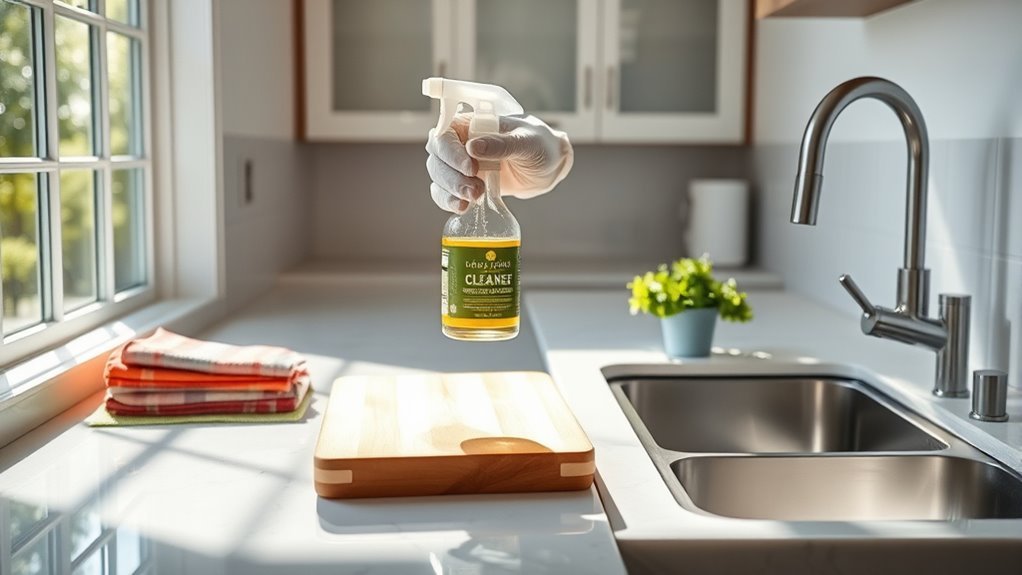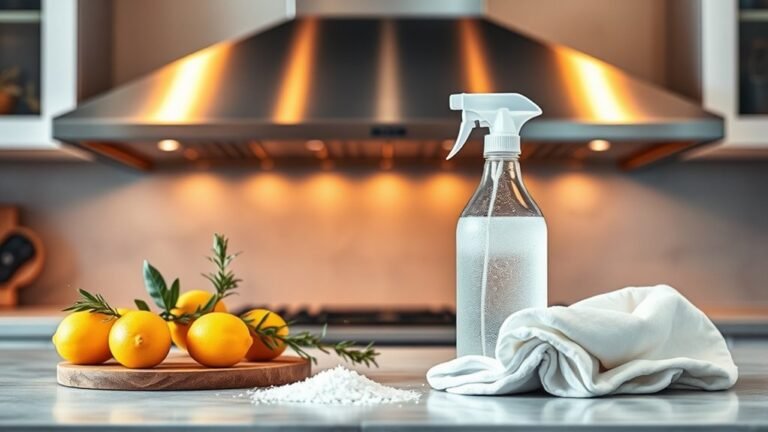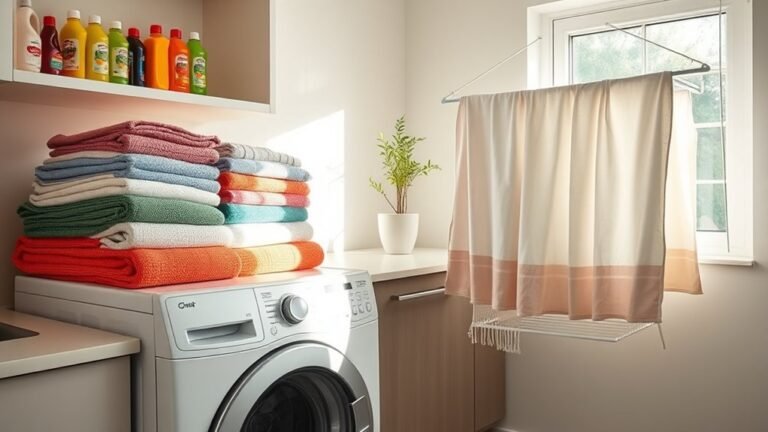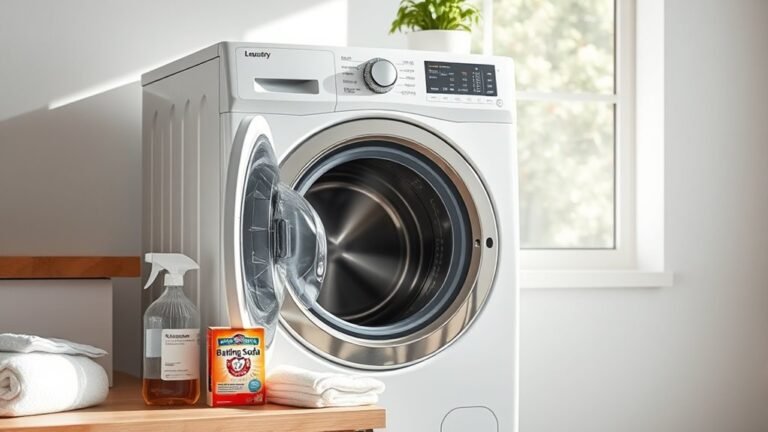How to Clean Your Kitchen Safely
To clean your kitchen safely, start by choosing eco-friendly, multi-surface cleaners that protect your health. Clear countertops and organize items by use to keep the space functional. Wash dishes with gentle, effective detergents and sanitize your sink regularly to prevent bacteria. Disinfect counters thoroughly, then manage waste properly with sealed containers and composting. Use protective gloves to shield your skin, and set a consistent schedule to keep things fresh. There are simple ways to make your cleaning routine even more efficient and safe.
Gather Safe and Effective Cleaning Supplies
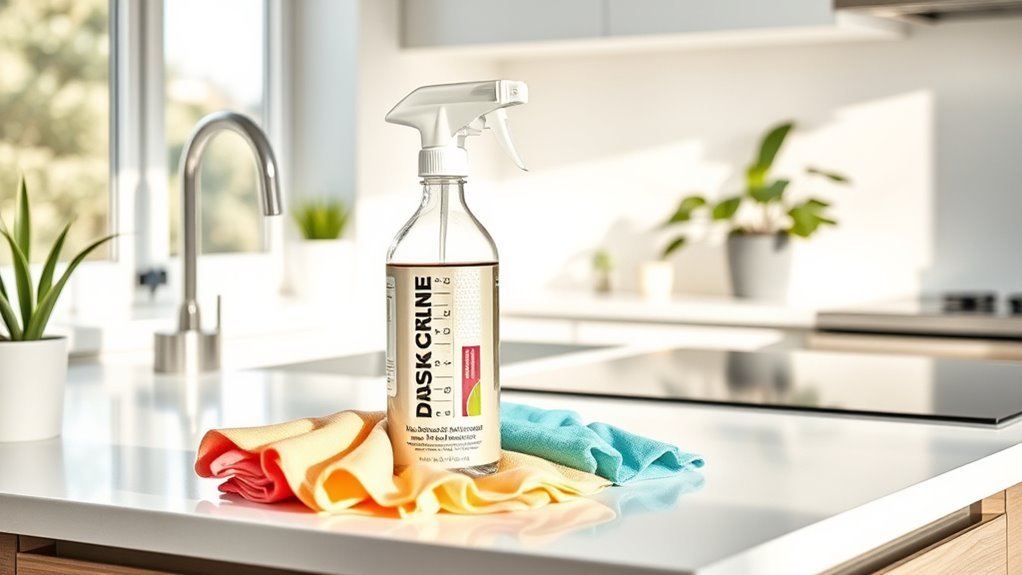
Before you begin cleaning, make sure you have safe and effective supplies on hand. Choosing eco friendly products lets you protect your health and the environment without sacrificing power. You don’t have to be stuck with harsh chemicals that limit your freedom to breathe easily or feel safe in your own kitchen. Opt for multi surface cleaners that work well on counters, appliances, and sinks alike—this way, you simplify your routine while reducing waste. Having versatile, green products means you’re in control, free from unnecessary toxins and clutter. When gathering supplies, prioritize those made from natural ingredients and packaged responsibly. This mindful approach not only keeps your kitchen sparkling but also supports your values of independence and well-being every time you clean.
Clear and Organize Your Kitchen Space
Before you start cleaning, clear off your countertops by putting away any items that don’t belong. Take some time to arrange your cabinets neatly so you can find what you need quickly. This will make your cleaning process safer and more efficient.
Declutter Countertops Efficiently
Clearing your countertops is one of the quickest ways to make your kitchen feel more organized and spacious. Start by removing everything and sorting items into categories. Keep only the kitchen tools you use daily within easy reach, and store the rest away. This simple step frees up space and creates a sense of calm. Next, focus on counter organization by designating specific zones—like a coffee station or prep area—to streamline your workflow. Use small containers or trays to group similar items, preventing clutter from creeping back. Remember, a clear countertop not only looks great but also makes cleaning faster and safer. By efficiently decluttering, you reclaim your kitchen as a functional, inviting space where you’re free to cook and create without distractions.
Arrange Cabinets Neatly
While decluttering your countertops sets the stage, arranging your cabinets neatly takes your kitchen organization to the next level. You want your kitchen to feel open and free, so start by emptying your cabinets and sorting items by frequency of use. Use smart storage solutions like stackable shelves, pull-out baskets, or clear containers to maximize space. Good cabinet organization means everything has a designated spot—this reduces clutter and makes cleaning easier. Keep heavy or rarely used items on higher shelves, and daily essentials within easy reach. By thoughtfully arranging your cabinets, you create a kitchen that works for you, giving you the freedom to cook and clean efficiently without frustration. Clear, organized cabinets are the backbone of a safe, stress-free kitchen.
Wash Dishes and Clean the Sink Properly

You’ll want to wash your dishes thoroughly to remove all food particles and grease. Afterward, make sure to sanitize your kitchen sink to prevent bacteria buildup. These steps help keep your kitchen clean and safe for food preparation.
Effective Dishwashing Techniques
Although washing dishes might seem straightforward, using effective techniques guarantees they come out spotless and your kitchen stays hygienic. To enjoy freedom from grime and waste, try these dishwashing tips:
- Rinse off food scraps before washing to prevent buildup.
- Use eco friendly detergents—they’re gentle on the environment and tough on grease.
- Wash dishes in order: glasses, utensils, plates, then pots to keep water cleaner longer.
- Scrub your sink regularly during dishwashing to avoid lingering residues.
Sanitizing Your Kitchen Sink
Since the kitchen sink is a hotspot for bacteria, cleaning it properly after washing dishes is essential to keep your space sanitary. Start by rinsing the sink thoroughly to remove food debris, then apply safe cleaning agents like diluted bleach or vinegar solutions. These help break down grime without harsh chemicals limiting your freedom to use the sink comfortably. Use a scrub brush or sponge to reach all corners, ensuring you tackle every surface. After scrubbing, rinse well with hot water to wash away residues. For ongoing sink sanitization techniques, you can regularly spray a natural disinfectant or use a dishwasher-safe sink insert. By adopting these habits, you’re not just cleaning—you’re creating a healthier, freer kitchen environment where you can cook and relax without worry.
Disinfect Countertops and Food Preparation Areas
Before preparing any meals, make sure to thoroughly disinfect your countertops and food preparation areas to prevent the spread of harmful bacteria. Keeping these surfaces clean gives you the freedom to cook confidently without worry. Here’s how you can do it efficiently:
- Clear the area of any crumbs or debris using a clean cloth or brush.
- Use an appropriate disinfectant spray or solution designed for kitchen use.
- Wipe down all surfaces with your disinfecting solution, ensuring full coverage.
- Rinse with a damp cloth and let the surfaces air dry to avoid chemical residue.
Always choose the right cleaning tools to avoid scratching or damaging your countertops. Staying consistent with disinfecting surfaces keeps your kitchen safe and your cooking space fresh.
Clean and Maintain Kitchen Appliances
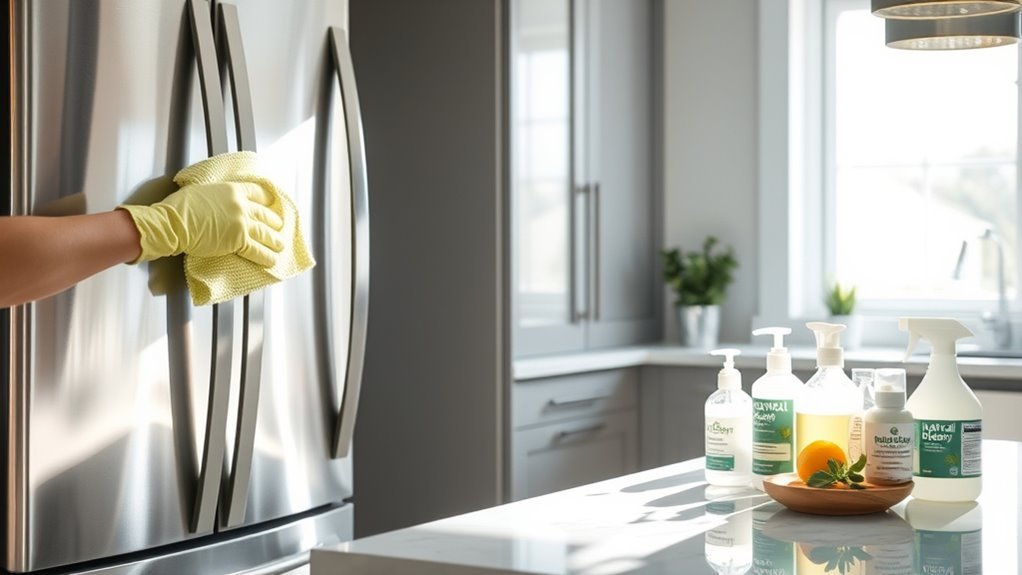
Keeping your kitchen appliances clean and well-maintained is essential for their longevity and performance. Regular appliance maintenance not only guarantees they work efficiently but also enhances kitchen safety by preventing malfunctions. You can take control by following a simple routine tailored to each appliance.
| Appliance | Maintenance Tip | Kitchen Safety Benefit |
|---|---|---|
| Refrigerator | Clean coils and door seals | Prevents overheating |
| Oven | Remove spills and grease | Reduces fire risk |
| Microwave | Wipe interior after use | Avoids food contamination |
| Dishwasher | Clear filters regularly | Guarantees proper sanitation |
Safely Handle and Dispose of Kitchen Waste
Although handling kitchen waste might seem straightforward, doing it safely is essential to prevent odors, pests, and potential health hazards. To keep your kitchen fresh and hygienic, you’ll want to master proper waste management. Here’s how you can do it:
- Practice waste segregation by separating recyclables, compostables, and trash to reduce contamination.
- Use effective composting methods for food scraps, which not only cut waste but enrich your garden soil.
- Store waste in sealed containers to avoid attracting pests and minimize smells.
- Dispose of hazardous materials, like batteries or chemicals, according to local guidelines to protect yourself and the environment.
Protect Yourself While Cleaning the Kitchen
How can you stay safe while tackling kitchen cleaning tasks? First, always wear protective gear like gloves and goggles to shield your skin and eyes from harsh substances. It’s a simple way to keep your freedom to cook and create without worry. Next, choose safe chemicals—opt for eco-friendly, non-toxic cleaners that do the job without harmful fumes. Avoid mixing products, as this can release dangerous gases. Make sure your kitchen is well-ventilated by opening windows or turning on fans. If you’re using sprays or powders, handle them carefully to prevent inhalation or spills. By prioritizing protective gear and safe chemicals, you maintain control over your environment and health, letting you clean efficiently while safeguarding your well-being.
Establish a Regular Cleaning Schedule
Setting a consistent cleaning schedule can make a big difference in managing your kitchen’s cleanliness and hygiene. When you control the cleaning frequency, you take charge of your space without feeling overwhelmed. Here’s how to establish a schedule that fits your lifestyle:
- Decide how often you want to tackle daily, weekly, and monthly tasks.
- Use schedule reminders on your phone or calendar to stay on track.
- Break tasks into manageable chunks to keep it stress-free.
- Adjust your plan as needed to maintain freedom and flexibility.
Frequently Asked Questions
Can I Use Natural Cleaning Products Instead of Chemicals?
You absolutely can use natural alternatives instead of harsh chemicals. Choosing eco friendly solutions lets you clean effectively while feeling good about your impact on the environment. These options, like vinegar, baking soda, or lemon juice, give you freedom from toxic fumes and unnecessary additives. Plus, they’re often safer around kids and pets. Embracing natural products empowers you to maintain a fresh, clean space without compromising your values or health.
How Do I Clean Mold From Kitchen Walls or Ceilings?
To tackle mold on your kitchen walls or ceilings, start by using effective mold removal techniques like scrubbing with a vinegar solution or a mild bleach mix. Wear gloves, open windows, and keep the area ventilated. To keep mold from coming back, adopt prevention strategies such as controlling humidity, fixing leaks promptly, and ensuring good airflow. By acting quickly and staying consistent, you’ll reclaim your kitchen’s freshness and enjoy a healthier, mold-free space.
What’S the Best Way to Remove Grease Stains From Kitchen Cabinets?
If you want to tackle grease stains on your kitchen cabinets, start with effective grease removal techniques like mixing warm water, dish soap, and a splash of vinegar. This cabinet cleaning solution breaks down grease without harsh chemicals. Use a soft cloth or sponge to gently scrub the stains. For stubborn spots, baking soda paste works wonders. You’ll love how effortlessly your cabinets shine, giving you the freedom to enjoy a fresh, clean kitchen vibe.
How Often Should I Deep Clean My Kitchen Drains?
You should aim to deep clean your kitchen drains about once every one to three months to keep them running smoothly. Regular drain maintenance prevents clogs and bad odors from building up. Of course, if you notice slow drainage or smells sooner, don’t wait—clean them right away. Sticking to a consistent cleaning frequency gives you freedom from unexpected plumbing issues, letting you enjoy your kitchen without hassle.
Can Kitchen Cleaning Affect Food Allergies or Sensitivities?
Imagine your kitchen as a garden where every plant (ingredient) must thrive without harm. If you’re not careful with allergen awareness and cleaning methods, hidden seeds of contamination could sprout, triggering food allergies or sensitivities. By choosing your cleaning tools wisely and wiping surfaces thoroughly, you’re freeing yourself from unwanted reactions. So, staying vigilant in your kitchen lets you cultivate freedom to enjoy meals safely, without fear or restraint.
